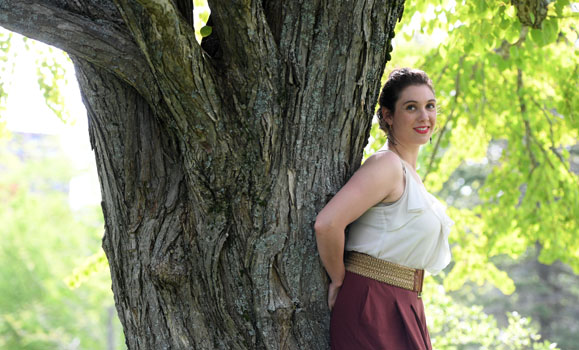What would a tree say if it could talk?
Resource and Environmental Management student Julietta Sorensen Kass is offering Halifax residents and visitors alike a chance to find out with a public engagement project called , coming this summer to the Halifax Public Gardens.
The project invites people to send text messages to the trees they meet in the Public Gardens. Participants will receive a reply text from a volunteer with information about the cultural significance and biology of the tree.
“We’re calling on trees in an old-style way using modern media," says Julietta. “People would think writing a letter to a tree is beautiful and sacred.” She wants to see if people will be able to forge a similar connection over text message or social media.
The seed of an idea
The idea came to Julietta at an urban forestry conference where she heard about a project in Melbourne, Australia. Email addresses created to track maintenance issues for individual trees were flooded with letters from citizens who wanted to connect with the trees emotionally: thanking them for providing oxygen and shade, asking how they are doing, paying them compliments.

Julietta Sorensen Kass.
“I was telling a friend about it and the words just fell out of my mouth: what if you could text a tree?”
She brought the idea to Professor Peter Duinker in the School for Resource and Environmental Studies, to see if he would supervise the project. He helped her incorporate it into her Master’s of Resource and Environmental Management (MREM) internship, working on Halifax Regional Municipality’s Urban Forest Master Plan. Â
Julietta thinks that people have started to think of themselves as separate from nature as more of our population is concentrated in cities, and it’s changed how we relate to trees. “Trees aren’t going anywhere but our culture is evolving. We want to find a way for people to socially relate to trees.”
Participants will receive a short survey at the end of the project. Julietta hopes that the research will inform conservation and biodiversity initiatives. “Planting trees in cities is going to be a huge way forward for addressing climate change, and that’s not free,” she says. “We need to find out what people value about trees in cities.”
Growing a community
The project has attracted many enthusiastic supporters. “The Friends of the Public Gardens jumped right on board,” Julietta says. She's honoured to be the 2019 recipient of their Suellen Murray Educational Bursary, in memory of a Halifax woman who found solace in the Public Gardens after a brain tumor diagnosis.
There are 14 volunteers signed up as “tree-speakers” who will voice the trees by text message. Some of them have contributed playful names to their assigned trees. There’s Leaf Erikson, an elm named for a Norse explorer. Tree Tree O’

